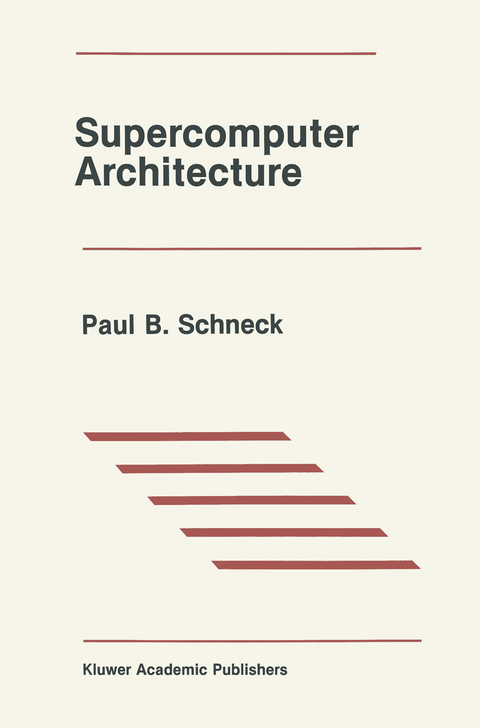
Supercomputer Architecture
Seiten
1987
Kluwer Academic Publishers (Verlag)
978-0-89838-238-9 (ISBN)
Kluwer Academic Publishers (Verlag)
978-0-89838-238-9 (ISBN)
Supercomputers are the largest and fastest computers available at any point in time. Subsequent improvements depended on developing a new generation of computers employing a new model of computation: single-instruction multiple data (SIMD) processors (Chapters 5-7).
Supercomputers are the largest and fastest computers available at any point in time. The term was used for the first time in the New York World, March 1920, to describe "new statistical machines with the mental power of 100 skilled mathematicians in solving even highly complex algebraic problems. " Invented by Mendenhall and Warren, these machines were used at Columbia University'S Statistical Bureau. Recently, supercomputers have been used primarily to solve large-scale prob lems in science and engineering. Solutions of systems of partial differential equa tions, such as those found in nuclear physics, meteorology, and computational fluid dynamics, account for the majority of supercomputer use today. The early computers, such as EDVAC, SSEC, 701, and UNIVAC, demonstrated the feasibility of building fast electronic computing machines which could become commercial products. The next generation of computers focused on attaining the highest possible computational speeds. This book discusses the architectural approaches used to yield significantly higher computing speeds while preserving the conventional, von Neumann, machine organization (Chapters 2-4). Subsequent improvements depended on developing a new generation of computers employing a new model of computation: single-instruction multiple data (SIMD) processors (Chapters 5-7). Later machines refmed SIMD architec ture and technology (Chapters 8-9). SUPERCOMPUTER ARCHITECI'URE CHAPTER! INTRODUCTION THREE ERAS OF SUPERCOMPUTERS Supercomputers -- the largest and fastest computers available at any point in time -- have been the products of complex interplay among technological, architectural, and algorithmic developments.
Supercomputers are the largest and fastest computers available at any point in time. The term was used for the first time in the New York World, March 1920, to describe "new statistical machines with the mental power of 100 skilled mathematicians in solving even highly complex algebraic problems. " Invented by Mendenhall and Warren, these machines were used at Columbia University'S Statistical Bureau. Recently, supercomputers have been used primarily to solve large-scale prob lems in science and engineering. Solutions of systems of partial differential equa tions, such as those found in nuclear physics, meteorology, and computational fluid dynamics, account for the majority of supercomputer use today. The early computers, such as EDVAC, SSEC, 701, and UNIVAC, demonstrated the feasibility of building fast electronic computing machines which could become commercial products. The next generation of computers focused on attaining the highest possible computational speeds. This book discusses the architectural approaches used to yield significantly higher computing speeds while preserving the conventional, von Neumann, machine organization (Chapters 2-4). Subsequent improvements depended on developing a new generation of computers employing a new model of computation: single-instruction multiple data (SIMD) processors (Chapters 5-7). Later machines refmed SIMD architec ture and technology (Chapters 8-9). SUPERCOMPUTER ARCHITECI'URE CHAPTER! INTRODUCTION THREE ERAS OF SUPERCOMPUTERS Supercomputers -- the largest and fastest computers available at any point in time -- have been the products of complex interplay among technological, architectural, and algorithmic developments.
1 Introduction.- 2 The IBM 7030 Stretch.- 3 The CDC 6600.- 4 The IBM 360–91.- 5 The CDC STAR-100.- 6 The ILLIAC IV.- 7 The CRAY-1.- 8 The CYBER 205.- 9 The Massively Parallel Processor.- References and Bibliography.
| Reihe/Serie | The Springer International Series in Engineering and Computer Science ; 31 |
|---|---|
| Zusatzinfo | XVI, 199 p. |
| Verlagsort | New York |
| Sprache | englisch |
| Maße | 155 x 235 mm |
| Themenwelt | Mathematik / Informatik ► Informatik ► Theorie / Studium |
| ISBN-10 | 0-89838-238-6 / 0898382386 |
| ISBN-13 | 978-0-89838-238-9 / 9780898382389 |
| Zustand | Neuware |
| Haben Sie eine Frage zum Produkt? |
Mehr entdecken
aus dem Bereich
aus dem Bereich
was jeder über Informatik wissen sollte
Buch | Softcover (2024)
Springer Vieweg (Verlag)
CHF 53,15
Grundlagen – Anwendungen – Perspektiven
Buch | Softcover (2022)
Springer Vieweg (Verlag)
CHF 48,95
Eine Einführung in die Systemtheorie
Buch | Softcover (2022)
UTB (Verlag)
CHF 34,95


